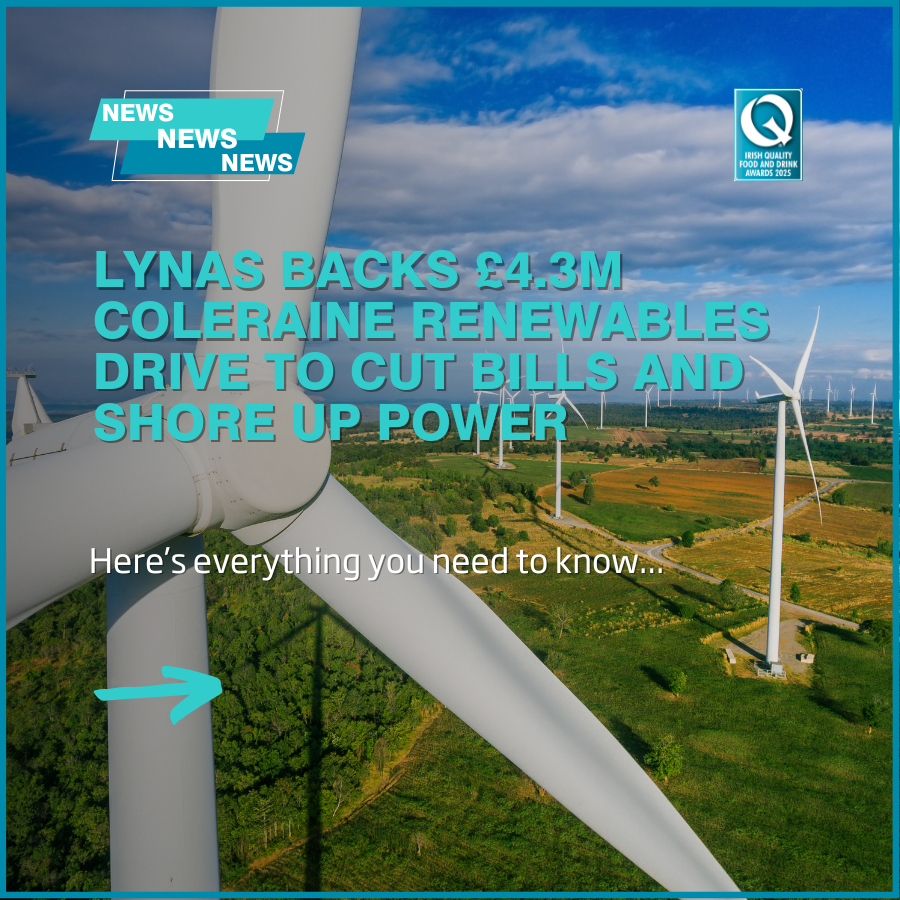
Lynas backs £4.3m Coleraine renewables drive to cut bills and shore up power
Coleraine-based Lynas Foodservice is investing £4.3m in rooftop solar, a 1.25MW wind turbine, battery storage and a microgrid to deliver about 75% renewable electricity on-site, reduce energy costs and improve resilience for its warehouses, offices and retail outlets.
Lynas Foodservice has announced a £4.3 million investment in on‑site renewable energy at its Coleraine operations, installing rooftop solar arrays and a 1.25MW wind turbine with backing from Bank of Ireland. According to the Belfast Telegraph report of the project, the scheme is intended to cut the company’s energy costs and carbon emissions while improving energy security across its warehouses, offices and retail outlets.
The company says the installation is complemented by a microgrid and on‑site battery storage that will allow it to import generated renewable energy into storage and export surplus power back to the wider grid. Managing director Andrew Lynas told the Belfast Telegraph the measures will deliver roughly 75% renewable electricity across the Coleraine site and said the operation’s constant, 24/7 power demand — largely from freezers and chillers — means the project has the equivalent effect of taking about 700 homes off the local grid.
Bank of Ireland, which supported the financing of the project, welcomed the investment. Danielle Whoriskey of Bank of Ireland told the original report that the lender is “committed to playing our part by supporting local businesses to integrate environmentally friendly infrastructure and operations as they evolve and expand,” framing the deal as an example of how finance can help firms decarbonise while strengthening resilience.
Lynas is a long‑established family‑run foodservice group based at Loughanhill Industrial Estate in Coleraine. Company material and local press reports trace the business back nearly seven decades and note three generations of family involvement. The business operates multiple retail outlets, has recently expanded operations into Scotland and has invested in redeveloping its Coleraine site as part of the latest phase of growth.
Public profiles and industry directories underline the company’s scale within the island’s foodservice supply chain: the group’s own about‑us information highlights a logistics operation delivering some 8,000 weekly consignments, while Bord Bia’s directory records a turnover above €180 million and more than six hundred employees. Earlier reporting, dating from 2015, placed annual turnover above £100 million as the business established a nationwide distribution footprint — figures that reflect growth over different periods and sources rather than a single, directly comparable snapshot.
The renewables drive forms part of a wider corporate sustainability push set out in the company’s Spring edition of its Your Food! magazine, which frames wind, rooftop solar and battery storage as central to Lynas’s 2025 strategy to build a greener, more resilient foodservice business. The same customer‑facing material also highlights service innovations such as the Your Food! Show in Coleraine and an “Order Your Way” initiative designed to give customers multiple ordering channels.
Beyond the plant, Lynas has signalled broader community and ESG commitments: the company recently became an ESG partner of Young Enterprise Northern Ireland, a move in which Andrew Lynas said the firm wanted to invest in young people and share business expertise with the next generation. That activity sits alongside accreditations and buying‑group collaborations noted in industry listings and underlines how the business positions sustainability as part of its market proposition and corporate responsibility.
Taken together, the project illustrates a growing pattern among energy‑intensive foodservice operators that are seeking to lock in price certainty and reduce emissions through on‑site generation and storage. The company frames the initiative as both a commercial and environmental step — though the precise long‑term impact on grid demand and carbon accounting will depend on operational performance, export arrangements and how the stored energy is counted in sector‑level reporting.
If realised as described by the company and its bankers, the scheme would materially reduce Lynas’s exposure to energy price volatility while lowering its reported scope‑2 emissions. That said, the figures cited — such as the projected 75% renewable supply for the site and the “700 homes” equivalence — are company estimates reported to local media and, as with many corporate sustainability claims, will be subject to independent verification as the project moves into full operation.
